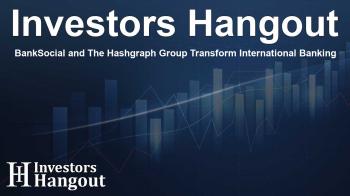BankSocial and The Hashgraph Group Transform International Banking

BankSocial and The Hashgraph Group Transform International Banking
BankSocial, in collaboration with The Hashgraph Group, has marked a significant milestone in the world of financial transactions. The two entities have successfully facilitated the first international transfer of a private liquidity token. This accomplishment signifies a breakthrough in chain-agnostic bank-to-bank settlement methods using leading blockchain technologies.
A New Era of Transactions
This initiative is not just an enhancement in financial services; it paves the way for entirely new financial infrastructures. By utilizing advanced blockchain platforms such as Hedera, Ripple, and Solana, BankSocial is steering the industry towards a more efficient and interconnected financial landscape. The Private Liquidity Network launched by these organizations sets a remarkable precedent for how banks can handle cross-border transactions effortlessly.
Integrating Innovative Technologies
The Hashgraph Group’s expertise in distributed ledger technology has been instrumental in achieving this milestone. Their systems allow for real-time processing of international transactions across multiple blockchain protocols. The innovation contributes to a more revolutionary financial transaction environment, where obstacles posed by traditional intermediaries can be overcome.
Benefits for Credit Unions and Banks
Credit unions and banks are set to gain tremendously from this initiative. For years, these institutions have struggled to access international settlement capabilities. However, BankSocial's advancements make it easier for them to partake in remittances and transact in digital currencies at scale, providing a streamlined pathway into modern financial solutions.
Tokens issued are redeemable at participating institutions, enabling foreign currency access directly into U.S. digital dollars. This model eliminates reliance on traditional, often costly, cross-border payment systems.
Leadership Insights
CEO John Wingate of BankSocial articulated the significance of their collaboration, stating, "This is not just a new feature; it’s a new financial rail. Our partnership has shown that international settlement across multiple chains is feasible today, connecting governments, banks, and fintechs to U.S. digital dollars securely." His words underscore the urgency for banks to modernize their systems and adopt these progressive financial methodologies.
Changing the Landscape of Finance
Stefan Deiss, Co-Founder and CEO of The Hashgraph Group, echoed this sentiment, emphasizing how distributed ledger technology can address age-old challenges in international finance. By building a compliant settlement structure, they are establishing a foundation for global interoperability in digital asset transactions.
As more countries look to enhance their digital currency initiatives, this development serves as a promising indicator of the future of tokenized cross-border liquidity, aligning with regulatory requirements and ensuring transparency in all transactions.
Onboarding New Institutions
BankSocial is diligently working to expand its Private Liquidity Network. They are focused on onboarding more credit unions and banks, offering fresh opportunities for these institutions to broaden their international services and facilitate digital asset conversions securely. This expansion aims to foster an inclusive financial ecosystem.
The Future of Global Transactions
The partnership between BankSocial and The Hashgraph Group represents a significant leap toward the future of international remittance. It signals a new era where global settlements can be processed quickly, securely, and efficiently.
Institutions looking to provide expanded international offerings or facilitate stablecoin and digital dollar conversions should consider engaging with this transformative collaboration.
Frequently Asked Questions
What is the significance of the partnership between BankSocial and The Hashgraph Group?
The collaboration between these organizations facilitates a new standard for secure and compliant international transactions using advanced blockchain technologies.
How does the Private Liquidity Network operate?
The Private Liquidity Network enables institutions to onboard foreign currency directly into U.S. digital dollars, streamlining cross-border transactions without relying on traditional intermediaries.
What benefits do credit unions gain from this initiative?
Credit unions will have the ability to engage in remittances and digital currency conversions, significantly enhancing their service offerings to customers.
How does this initiative address challenges in traditional banking?
This approach reduces costs and increases efficiency for international settlements, providing a compliant alternative to outdated correspondent banking models.
What future developments can be expected in financial services?
With further onboarding of financial institutions, we can expect a broader adoption of digital assets and innovative financial services resulting in a more robust economic infrastructure.
About The Author
Contact Thomas Cooper privately here. Or send an email with ATTN: Thomas Cooper as the subject to contact@investorshangout.com.
About Investors Hangout
Investors Hangout is a leading online stock forum for financial discussion and learning, offering a wide range of free tools and resources. It draws in traders of all levels, who exchange market knowledge, investigate trading tactics, and keep an eye on industry developments in real time. Featuring financial articles, stock message boards, quotes, charts, company profiles, and live news updates. Through cooperative learning and a wealth of informational resources, it helps users from novices creating their first portfolios to experts honing their techniques. Join Investors Hangout today: https://investorshangout.com/
The content of this article is based on factual, publicly available information and does not represent legal, financial, or investment advice. Investors Hangout does not offer financial advice, and the author is not a licensed financial advisor. Consult a qualified advisor before making any financial or investment decisions based on this article. This article should not be considered advice to purchase, sell, or hold any securities or other investments. If any of the material provided here is inaccurate, please contact us for corrections.

